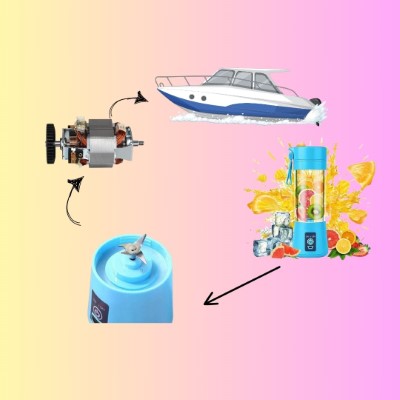Electric motors are ubiquitous in our daily lives, powering everything from household appliances to industrial machinery. However, they can also be harnessed for educational purposes and fun learning projects, providing hands-on experiences in engineering, physics, and electronics. In this blog, we will explore how we can utilize the electric motor found inside a popular product, the “Portable and Rechargeable Juice Blender,” for various engaging projects.
Challenges in Sourcing Motors
Finding a single electric motor suitable for a project can be challenging. Many motors available in the market are sold in bulk quantities or are specialized components that are not easily accessible to hobbyists and enthusiasts. Moreover, motors with specific performance characteristics, such as high speed and torque, may come with a hefty price tag, often exceeding the cost of the entire product.
Motor Specification Analysis
Let’s delve into the specifications of the electric motor embedded within the Portable and Rechargeable Juice Blender:
- No-load RPM: 22000
- Rated RPM: 15000
- Rated Current: 10-12A
- Voltage: 3.7 V
Based on these specifications, we can calculate the power of the motor, which falls within the range of approximately 37-40 watts. Such a high-speed motor promises exciting possibilities for various applications beyond its original design.

Potential Fun Learning Projects
- Speed Boat Prototype: The high-speed capabilities of the motor make it ideal for propelling a miniature speed boat across water bodies. By coupling the motor with a suitable propeller and a waterproof enclosure, enthusiasts can create their own remote-controlled speed boat, learning about buoyancy, propulsion systems, and control mechanisms in the process.
- Drone Construction: Utilizing the motor as a propulsion source, enthusiasts can construct their own drone or quadcopter. This project offers a hands-on opportunity to delve into aerodynamics, stability control, and flight dynamics. By integrating additional sensors and controllers, learners can explore autonomous navigation and stabilization algorithms, making it an immersive educational experience.
- High-Speed Applications: Beyond traditional hobbies, the motor’s high-speed capabilities open avenues for experimentation in various high-speed applications. Enthusiasts can explore projects such as high-velocity toy car races, miniature wind turbines for renewable energy demonstrations, or even small-scale centrifuges for educational purposes in biology and chemistry laboratories.
- Motor Speed Control Experiments: The motor’s rated current and voltage specifications allow for experimentation with speed control mechanisms. Enthusiasts can explore pulse-width modulation (PWM) techniques, feedback control loops, and motor driver circuits to regulate the speed of the motor accurately. This project offers insights into the principles of electrical engineering and control systems.
Identifying the Motor Type
Upon disassembling the Portable and Rechargeable Juice Blender, we can confirm that the motor housed within is a Universal Motor. Universal motors are versatile, capable of operating on both AC and DC power sources. They are often found in appliances requiring high speeds and variable torque. The presence of a wound stator and a commutator, along with brushes, indicates that the motor is indeed a universal motor.
Conclusion
In conclusion, the electric motor inside the Portable and Rechargeable Juice Blender presents a valuable resource for fun learning projects and educational exploration. By leveraging its high-speed capabilities and power output, enthusiasts can embark on a journey of discovery, delving into various disciplines of science, technology, engineering, and mathematics (STEM). Whether constructing speed boats, drones, or experimenting with speed control mechanisms, the motor offers endless possibilities for creativity and learning. With ingenuity and curiosity, enthusiasts can unlock the full potential of this humble yet powerful component, transforming it into a catalyst for innovation and discovery.
